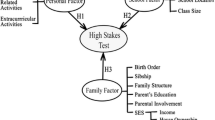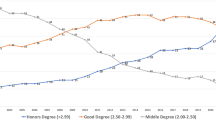Abstract
In Malaysia, many Malaysian Certificate of Education (MCE or SPM in local terms) students use their SPM forecast to choose their subject combination when they enroll at Pre-university level program in a private institution. Previous research has shown that secondary students with high levels of English proficiency and exposure to challenging Mathematics questions can improve their future performance in their subject. The purpose of this study is to establish the relationship between students’ SPM forecast results and academic performance of the same students in Business Studies at Pre-university level. A total of 97 respondents were involved in this study. The grades awarded in the SPM forecast were collected and compared with their academic performance in Pre-university Accounting or Economics or both in the first semester. The data was analyzed using Spearman’s rank-order correlation. The results indicated the following: (1) SPM forecast results for English Language, Modern and Additional Mathematics, Chemistry, Physics, History, and Moral Studies exhibited a significant positive relationship with Pre-university Accounting or Economics or both, and (2) SPM forecast results for Accounting and Foundation in Economics do not correlate with Pre-university Accounting or Economics or both. Among the 14 subjects from the SPM forecast, seven (7) revealed significant relationships with Pre-university Business subjects measured in Accounting or Economics or both.
Access this chapter
Tax calculation will be finalised at checkout
Purchases are for personal use only
Similar content being viewed by others
References
Abe, I., Ilogu, G., & Madueke, I. (2014, July). Effects of goal-setting skills on students’ academic performance in English language in Enugu Nigeria. Journal of New Approaches in Educational Research, 3(2), 93, 7p. doi:10.7821/naer.3.2.93-99
Adeleke, M. S., Binuomote, M. O., & Adeyinka, M. S. (2013, May). Determinants of students’ academic performance in financial accounting among senior secondary school leavers in Oyo State. International Journal of Business and Management Invention, 2(5), 48–59.
Adelman, C. (1999). Answers in the total box: Academic intensity, attendance patterns, and bachelor’s degree attainment. Washington, DC: U.S. Department of Education, Office of Educational Research and Improvement.
Adodo, S. O., & Oyeniyi, J. D. (2013). Student variables as correlates of secondary school students’ academic performance in biology. International Journal of Science and Research (IJSR), 2(7), 9.
Ahmed, S. (2009). The Johns Hopkins University and Saifuddin Ahmed. Retrieved on May 2, 2014, from http://ocw.jhsph.edu/courses/StatMethodsForSampleSurveys/PDFs/Lecture5.pdf
Alfan, E., & Othman, M. N. (2005). Undergraduate students’ performance: The case of University of Malaya. Quality Assurance in Education, 13(4), 329–343.
Awi, A. (2008). The relationship between teacher’s knowledge of the commerce learning experience and evaluation and the teacher’s management of the implementation of the commerce in secondary schools, Kuala Lumpur. Masters thesis, Universiti Putra Malaysia. Retrieved on August 27, 2014, from http://psasir.upm.edu.my/4861/1/FPP_2008_5.pdf
Cambridge University Reporter. (2003). Indicators of academic performance. Retrieved on April 23, 2014, from http://www.admin.cam.ac.uk/reporter/2002-03/weekly/5913/6.html
Ch’ng Pei Cheng, Teng Mei Tuan, Ng Ci Xiang, Ch’ng Pei Eng. (2011). An investigation on the relationships between SPM and A-Level results. In 3rd international conference of teaching and learning. INTI International University, Malaysia.
Chua, Y. P. (2006). Research statistics. Shah Alam: McGraw-Hill Education.
Davies, A. (1988). Operationalizing uncertainty in language testing, an argument in favour of content validity. Language Testing, 5(1), 32–48.
Derek, C. (2007). Students’ attitudes toward chemistry lessons: The interaction effect between grade level and gender. Journal of Research in Education, 5, 1573–1898.
Ismail, N. A., & Othman, A. (2006). Comparing university academic performances of HSC students at the three art-based faculties. International Education Journal, 7(5), 668–675.
Kam & Ch’ng. (2009). Predicting academic performance of engineering diploma students. In Proceedings of the 2nd International Conference of Teaching and Learning (ICTL 2009). INTI University College, Malaysia. Retrieved on April 28, 2014, from https://my.laureate.net/Faculty/…/4B-04-P102%20(Malaysia).pdf
Kong, J., Powers, S., Starr, L., & Williams, N. (2012). Connecting english language learning and academic performance: A prediction study. American Educational Research Association. Vancouver: Pearson.
Krejcie, R. V., & Morgan, D. W. (1970). Determining sample size for research activities. Educational and Psychological Measurement, 30, 607–610.
Malaysia. Ministry of Education. (2014). Secondary education. Retrieved on August 25, 2014, from http://www.moe.gov.my/v/pelajaran-menengah
Matthews, J. (2000 March 13). The 100 best high schools: Challenging kids by encouraging them to take tough high school courses produces students who can exceed later in college. Newsweek. Retrieved on April 26, 2014, from http://www.msnbc.msn.com/id/3032542/site/newsweek/
Oluwatosin, S. A., & Bamidele, E. F. (2014). Self-concept and academic performance of secondary school students in chemistry. International Journal of Social Sciences & Education, 4(4), 946–952.
Rosli, Y., Othman, H., Ishak, I., Lubis, S., Saat, N., & Omar, B. (2012). Self-esteem and academic performance relationship amongst the second year undergraduate students of Universiti Kebangsaan Malaysia, Kuala Lumpur campus. Procedia – Social And Behavioral Sciences, 60, 582–589.
Schaap, P., & Luwes, M. (2013). Learning potential and academic literacy tests as predictors of academic performance for engineering students. Acta Academica, 45(3), 181–214.
Suárez-Álvarez, J., Fernández-Alonso, R., & Muñiz, J. (2014). Self-concept, motivation, expectations, and socioeconomic level as predictors of academic performance in mathematics. Learning & Individual Differences, 30, 118–123. doi:10.1016/j.lindif.2013.10.019.
Universities Admissions Center, Universities Admission Index. (2006). Retrieved on February 14, 2007, from http://www.uac.edu.au/admin/uai.html
Wankel, C. (Ed.). (2010). Cutting-edge social media approaches to business education: Teaching with LinkedIn, Facebook, Twitter, second life, and blogs. Charlotte: Information Age Pub.
Author information
Authors and Affiliations
Corresponding author
Editor information
Editors and Affiliations
Rights and permissions
Copyright information
© 2015 Springer Science+Business Media Singapore
About this paper
Cite this paper
Chin, S.F., Lim, O.W. (2015). The Relationship Between Students’ Malaysian Certificate of Education Forecast Results and Academic Performance in Business Studies at Pre-university. In: Tang, S., Logonnathan, L. (eds) Taylor’s 7th Teaching and Learning Conference 2014 Proceedings. Springer, Singapore. https://doi.org/10.1007/978-981-287-399-6_50
Download citation
DOI: https://doi.org/10.1007/978-981-287-399-6_50
Publisher Name: Springer, Singapore
Print ISBN: 978-981-287-398-9
Online ISBN: 978-981-287-399-6
eBook Packages: Humanities, Social Sciences and LawEducation (R0)




